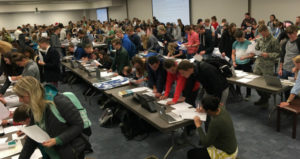
The Importance of Self-reflection Assignments Between Essays
Each semester I have students complete different writing assignments in my critical thinking and writing course, including two essays: essay 1 (20%) and essay 2


Each semester I have students complete different writing assignments in my critical thinking and writing course, including two essays: essay 1 (20%) and essay 2

This article first appeared in The Teaching Professor on October 5, 2017. © Magna Publications. All rights reserved. I teach online at an open enrollment institution, which

A college student opens the double doors and walks into a large conference room full of 65 long tables, set end-to-end and stacked six rows deep. Taking it all in, he asks his classmate, “How do we know where to put our projects?” before realizing large instructions with randomly assigned locations are projected up on the screen for all to see. He carefully places his project down onto spot #45, along with his required “Executive Summary,” a two-page document that provides his self-assessment and rationale about why he chose his project, what class content it caused him to research and learn more deeply, and how his project directly helped fulfill the four overall stated course outcomes.

How good are your students at assessing the quality of their work? Do they understand and act on the feedback you provide? I’ll wager that some students do. But the rest—they don’t know if what they’re turning in is good, not so good, or what they were supposed to do. If you ask how an assignment turned out, most students are fearfully noncommittal. The verbally confident proclaim that it’s excellent and hope you’ll remember that when you grade it. And this inability to ascertain quality and shortcomings applies to papers, essay answers, proposed solutions to open-ended messy problems, creative performances (artistic, musical, for example), and engineering and architectural projects.
This summer I am reading Linda Nilson’s book Creating Self-Regulated Learners: Strategies to Strengthen Students’ Self-Awareness and Learning Skills, which offers instructors a wealth of assignments and activities to help students grow their self-regulation and metacognitive abilities. Teaching students how to learn well on their own and to evaluate that learning is a goal I have been pursuing for the past few years, and I am convinced that occasional, brief self-assessment exercises can help college students perform better as well as understand the learning process.
Unfortunately, all too often performance on the first exam predicts performance throughout the course, especially for those students who do poorly on the first test. Faculty and institutions provide an array of supports for these students, including review sessions, time with tutors, more practice problems, and extra office hours, but it always seems it’s the students who are doing well who take advantage of these extra learning opportunities. How to help the students who need the help is a challenging proposition.
The liberal arts college where I teach recently underwent review for accreditation. Like many other colleges and universities, we were criticized for our lack of assessment. Faculty resistance, it seems, may be the biggest barrier to implementing institutional assessment measures (Katz, 2010; Weimer, 2013). Both Weimer and Katz accredited faculty resistance to fears that assessment data could be used for “comparison shopping” and “educational consumerism.” While these fears are justified, at my college another fear prevails; the fear that assessment will lead to hand-holding strategies that will discourage independent thought in our students and result in failure to adequately prepare them for professional life.
“Self-regulation is not a mental ability or an academic performance skill; rather it is the self-directive process by which learners transform their mental abilities into academic skills.” (p. 65) That definition is offered by Barry Zimmerman, one of the foremost researchers on self-regulated learning. It appears in a succinct five-page article that offers a very readable overview of research in this area.
Most faculty judiciously avoid having students self-assess because it seems hopelessly naïve to imagine them being able to look at anything beyond the desired grade. Even so, the ability to self-assess skills and completed work is important. Moreover, it is an ability acquired with practice and developed with feedback. It seems like the kind of skill that should be addressed in college. And perhaps there is a way.
Get exclusive access to programs, reports, podcast episodes, articles, and more!